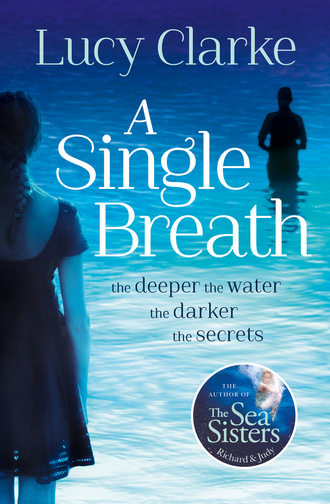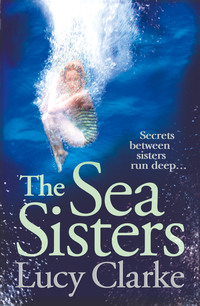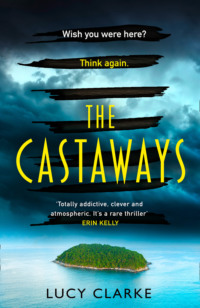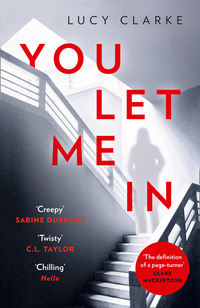
Полная версия
A Single Breath



Copyright
Published by HarperCollinsPublishers Ltd
1 London Bridge Street
London SE1 9GF
www.harpercollins.co.uk
First published in Great Britain by HarperCollinsPublishers 2014
Copyright © Lucy Clarke 2014
Lucy Clarke asserts the moral right to be identified as the author of this work.
A catalogue copy of this book is available from the British Library.
This novel is entirely a work of fiction. The names, characters and incidents portrayed in it are the work of the author’s imagination. Any resemblance to actual persons, living or dead, events or localities is entirely coincidental.
All rights reserved under International and Pan-American Copyright Conventions. By payment of the required fees, you have been granted the non-exclusive, non-transferable right to access and read the text of this e-book on screen. No part of this text may be reproduced, transmitted, down-loaded, decompiled, reverse engineered, or stored in or introduced into any information storage and retrieval system, in any form or by any means, whether electronic or mechanical, now known or hereinafter invented, without the express written permission of HarperCollins.
Source ISBN: 9780007481361
Ebook Edition © March 2014 ISBN: 9780007481378
Version: 2020-11-10
For James
Contents
Cover
Title Page
Copyright
Dedication
Prologue
Chapter 1
Chapter 2
Chapter 3
Chapter 4
Chapter 5
Chapter 6
Chapter 7
Chapter 8
Chapter 9
Chapter 10
Chapter 11
Chapter 12
Chapter 13
Chapter 14
Chapter 15
Chapter 16
Chapter 17
Chapter 18
Chapter 19
Chapter 20
Chapter 21
Chapter 22
Chapter 23
Chapter 24
Chapter 25
Chapter 26
Chapter 27
Chapter 28
Chapter 29
Chapter 30
Chapter 31
Chapter 32
Chapter 33
Chapter 34
Chapter 35
Chapter 36
Chapter 37
Chapter 38
Read on to enjoy an exclusive extract of The Castaways
Author’s Note
Acknowledgements
Reading Group Questions
A conversation with Lucy Clarke
The Story in Photos
About the Author
Keep up to date with Lucy Clarke
Also by Lucy Clarke
Keep Reading
About the Publisher
PROLOGUE
Pulling his hat down over his ears, Jackson glances at Eva, who is curled in bed, the duvet tucked under her chin. Her eyes stay closed as she murmurs a sleepy noise that means, Don’t go.
But he has to. He can’t lie next to her feeling the way he does. He’s been awake for hours staring into the empty darkness, thinking, thinking, rolling back through his decisions and their consequences. He needs to get out of this house, feel the sting of winter wind on his face.
He lifts a corner of the duvet, just enough to expose Eva’s bare shoulder where he places his lips. He breathes in the smell of her sleep-warmed skin. Then he smoothes the duvet back down, picks up his fishing gear, and leaves.
The beach is wild and empty in the gloom. It’s one of those English mornings he’s still getting used to when dawn never fully breaks and the lamps stay on indoors all day. He paces into the wind, jigging his shoulders to keep warm.
Reaching an outcrop of rocks that stretches right into the sea, Jackson pauses. He watches the waves come plunging and rolling towards the rocks, breaking in an explosion of white water. He waits for a lull between sets and, when it comes, he climbs onto the rocks and hurries across them, making his way towards the very end of the outcrop. That’s where the fish will be biting as the current runs the hardest. He’s nimble-footed from a childhood spent running barefoot on the rocks and cliffs of Tasmania. He used to launch himself from them into the sea, bellowing and whooping before the water swallowed him.
He makes it to the end before the next set hits, the rocks behind him disappearing beneath a surge of foam. Strong gusts whip the spray off the backs of the waves and the air is alive with moisture. He turns from the wind, crouches down and opens his tackle box. Christ, he wishes he’d worn gloves. It’s freezing out here. Spray hits him in the back of the neck and it’s icy. His numb fingers make him clumsy and he drops a lure and has to scrabble between the rocks to get it. Second time around he manages to thread it with more success.
Eventually he casts out. The motion, once familiar and soothing, gives him no relief this morning. His thoughts too closely match the desolate seascape that broils beneath an angry sky. Standing on the rocks – his body starting to chill – he has the looming sensation that everything is starting to unravel. It is as if he’s shedding his skin layer by layer until the sharp bones of who he really is will be visible to everyone.
The vibration of his mobile phone startles him. He holds the fishing rod with one hand while he grapples in his coat pocket with the other. It will be Eva. He pushes away the lethal, dark thoughts, letting his brow soften as he imagines the timbre of her sleep-clouded voice saying, Come back to bed …
Already he’s thinking that he will – that he’ll forget all this. If he jogs he’ll be there in ten minutes. He can slip back into the warmth of their bed, press his body against the curve of hers, and remind himself that it’s real.
But when he presses answer, it’s not Eva’s voice at all.
1
As she leaves the shelter of the headland, the full force of the wind hits Eva. Her hair whips back from her face and she hugs the flask of coffee tight to her chest. Clouds of sand gust along the shoreline, sending a tangled knot of fishing line pinwheeling along the beach.
A woman passes in the other direction, her purple coat flattened to her back by the wind. The fur-trimmed hood is pulled tight to her face, making Eva wish she’d thought to wear a hat. She’d forgotten how raw the weather is on the coast; in London it is muted by buildings and watched from behind windows.
She and Jackson had driven to Dorset last night for her mother’s birthday. It was a rush to get out of the city; Eva had been delayed at the hospital trying to turn a breeched baby, but still managed to wrap her mother’s present and clear the sink of their breakfast things before Jackson barrelled in late and exhausted from a meeting that had run over. The whole week had been like that: grabbing meals at different times, tension from work stalking them home, falling into bed too late and too shattered to talk. She’s pleased to have this weekend just to slow down.
Ahead, the rocks where Jackson will be fishing come into focus. Huge sombre boulders stretch right out into the sea. She wonders if he’s caught anything yet. It wasn’t long past dawn when she’d felt the give of the bed as Jackson slipped out from under the covers. She’d heard him stepping into his jeans, pulling on a sweater, and zipping up his coat. He’d leant over the bed and pressed a kiss on her bare shoulder. Her eyes had opened just enough to see him disappear through the doorway, a red woollen hat pulled down over his ears.
Just beyond the rocks she sees the flash of a boat. It disappears momentarily into a trough and she thinks the conditions are too rough to be out on the water today. She squints against the wind and sees it rise again on the crest of a wave: an orange lifeboat. She wonders whether there’s been an accident, and as soon as she has this thought, a slow trickle of unease seeps through her body.
In her childhood summers when her father was still alive, they would come to this beach every morning to swim together, her father making lunging rotations with his long, bony arms in a backstroke. She had loved those swims when the water was calm and the early sun glanced off the surface. But today the sea is something darker, forbidding.
She scans the rocks for Jackson, eyes watering in the wind. He must be here; it’s the spot he always fishes when they’re visiting her mother. But now all that breaks the grey wash of sea and sky is the lifeboat. Even as she tells herself that it could be on a training mission, her knees are bending, carrying her forward into a run.
The flask bounces against her hip and her boots flick up sand. Her breath comes in warm, quick clouds and she feels restricted by the layers of her clothes – her jeans unyielding against her knees, her coat buttons tight against her breastbone.
When she reaches the base of the rocky outcrop, she finds a dozen or so people gathered there. Her gaze moves over them and then travels up the length of the rocks, where waves charge, tossing white water high into the bruised sky. The air is heavy with the smell of salt.
She can’t see Jackson.
Eva hurries towards a man zipped into a waxed jacket, his steel-grey eyebrows ruffled by the wind. ‘Why’s the lifeboat out?’ she asks, trying to keep the panic from her voice.
‘Someone was swept off the rocks.’
Her heart lurches. ‘Who?’
‘A fisherman, they think.’
For a moment she has a feeling of relief because she knows her husband is not a fisherman: he’s a 30-year-old brand marketer for a drinks company. But then the man is saying, ‘Young, apparently. But maybe he’ll stand more of a chance against the cold.’
Eva feels all the air leave her lungs as if someone has grabbed her hard around the ribs. She drops the flask and yanks her mobile from her pocket, ripping off her gloves to dial. Her fingers are clumsy with the cold but she turns her back to the wind and keys in Jackson’s number.
Pressing the phone to her ear, she paces on the spot waiting for him to pick up.
‘Hi, this is Jackson,’ his voicemail says, and her heart stalls.
Dropping the phone into her pocket, she stumbles towards the rocks. A wide red sign reads DANGER, KEEP OFF. Her scarf flies behind her as she clambers over the wet boulders, the cry of wind filling her ears. Her breath is ragged, and spiked thoughts pierce at her, making her mind whirl. She tells herself to focus only on where she is putting each foot, placing one carefully in front of the other.
Ahead something colourful catches her attention. She picks her way over barnacle-lined rocks until she is close enough to see it.
A green plastic tackle box lies open, wedged between two rocks. She recognizes it instantly: she bought it for Jackson last Christmas to house the lures and weights that were gradually filling up his bedside drawer. Now salt water fills the trays, so that two bright blue lures float inside like dead fish.
There is a loud, shattering boom as a wave smashes into the rocks. Icy spray slashes the side of Eva’s face and she drops to her knees, clinging to the rock with numbed fingers.
‘Hey!’ someone shouts. ‘Get back!’
But she cannot move, cannot turn. She is frozen, fear leaden in her stomach. Her face smarts with the cold and the back of her head is wet. A slow trickle of water seeps beneath her scarf.
Seconds later, she feels the pressure of a hand on her shoulder. A policeman is standing over her, taking her by the arm, encouraging her to her feet. ‘It’s not safe,’ he shouts above the wind.
She shakes him off. ‘My husband!’ she cries, her words coming out in gusts. ‘He was fishing! Right here!’
The policeman stares down at her. There is a patch of dark stubble on his jawline, no larger than a thumbprint, which he must have missed when shaving this morning. Something like fear pricks his features as he says, ‘Okay. Okay. Let’s get onto the beach.’
He grips her arm, helping her stand. Her legs tremble as they move slowly over the wet rocks, him glancing over his shoulder watching for waves.
When they reach the sand, he turns to her. ‘Your husband was fishing here this morning?’
She nods. ‘His tackle box – it’s on the rocks.’
The policeman looks at her for a long moment without blinking. ‘We had a report earlier that a man fishing was swept in.’
Her voice is small: ‘Was it him?’
‘We can’t be sure yet.’ He pauses. ‘But it sounds like it’s possible, yes.’
Saliva fills her mouth and she twists away. The grey-green sea swills with current as she searches it for Jackson. She swallows. ‘How long ago?’
‘About twenty minutes. A couple reported it.’
She turns, following his gaze towards a middle-aged man and woman in dark blue parkas, a golden retriever at their feet. ‘Was it them? Did they see him?’
The moment he nods, Eva staggers past him.
The dog’s tail wags frantically as she approaches. ‘You saw my husband! He was fishing!’
‘Your husband?’ the woman says, distress clouding her narrow face. ‘We saw him, yes. I’m sorry—’
‘What happened?’
The woman twists her scarf between her fingers as she says, ‘We’d seen him fishing when we walked past earlier.’ She glances at her husband. ‘You said it looked dangerous with those waves, didn’t you?’
He nods. ‘When we turned to walk back, we saw he’d been swept in. He was in the water.’
‘We called the coastguard,’ the woman adds. ‘We tried to keep sight of him till they arrived … but … but we lost him.’
They must be mistaken, Eva thinks. It couldn’t be Jackson. ‘The man you saw – what was he wearing?’
‘Wearing?’ the woman repeats. ‘Dark clothes, I think. And a hat,’ she says, touching the back of her head. ‘A red hat.’
*
Sometime later, Eva’s mother arrives. She drapes a blanket over Eva’s shoulders and teases a fleecy hat over her short hair while asking questions in a low voice: How long has he been in the water? What has the coastguard said?
Eva watches the lifeboat making a search pattern, as if drawing a square in the water, and then working outward so the square gets larger and larger until at some point the lifeboat is so far away she wonders if it is even possible Jackson could have swum that far.
She wants to focus on anything but the freezing grip of the sea, so she cushions herself with the warmer memory of Jackson surprising her last month when he’d turned up at the hospital after one of her late shifts, holding a bag containing her favourite dress and a pair of gold heels. He’d told her to get changed because he was taking her out.
She’d slipped into the locker room, her heart skipping with excitement, and swapped her uniform for the black silk dress he’d chosen. She’d dabbed on some lipstick and smoothed back her dark hair, and the other midwives whistled and cooed as she came out, giving a little twirl.
Jackson had taken her to a blues bar in north London where the room was lit by candles and the rhythm of the double bass rocked through her chest. She’d leant her head against Jackson’s shoulder, feeling the atmosphere soak through her, washing away the strains of the day. They drank cocktails they couldn’t afford, and she danced in high heels that gave her blisters, but she hadn’t minded: she loved Jackson for his knack of taking a normal day and carving something beautiful from it.
The loud drone of the coastguard helicopter cuts through Eva’s thoughts. The sea beneath quivers and trembles. The white and red colours look bright, optimistic almost, against the darkening clouds, and a ripple of anticipation spreads through the growing crowd.
The policeman stands alone, rubbing his palms together to keep warm. Sometimes his radio crackles and he lifts it to his mouth. Eva glances over occasionally, studying him, watching for a sign to tell her how this day will end.
Mostly they wait in silence, listening to the waves crashing at sea, frothing white water bowling into the rocks. Her mother keeps hold of her hand and every now and then she says beneath her breath, ‘Come on, Jackson. Come on.’
*
When the last bit of daylight is fading, Eva hears crackling from the policeman’s radio. She turns and watches as he lifts it towards his mouth and speaks into it. He looks out over the water and nods once, solemnly. Then the radio is lowered.
He begins moving towards Eva. She shakes her head, thinking, Do not say it!
‘I’m afraid the coastguard’s calling off the search.’
Her gloved fingers clutch her scarf. ‘They can’t!’
‘The boat’s almost out of fuel and the helicopter’s lost the light. I’m sorry.’
‘He’s still out there!’
‘The coastguard has made the decision.’
‘But he won’t survive the night.’
The policeman’s gaze leaves her and settles on the sand at their feet.
She feels her mother’s hand around her waist, holding onto her, squeezing so tightly it’s as if she’s trying to absorb Eva’s pain.
‘He’s out there,’ Eva says finally. She pulls away and staggers down the beach, where the faint lights of the quay glow in the distance. She hears her mother calling after her, but she will not look back. She knows exactly where she needs to go.
Jackson is her husband and she will not give up on him.
*
The fisherman is just stepping onto the quay when Eva approaches him. ‘Is this your boat?’
‘Yeah,’ he says suspiciously.
She snatches a breath. ‘I need you to take me out in it. I’ll pay.’
‘Love, this boat isn’t going anywhere …’
‘My husband was swept from the rocks this morning,’ she says.
‘Your husband? Christ! I heard about it over the radio.’
She moves right past him, climbing into the boat as if she’s about to commandeer it.
‘Hey, listen –’
‘You understand currents? Tides?’ she says, trying to keep her voice level and focus only on the practical details.
‘Sure, but I can’t –’
‘Please,’ she says, swinging around to face him, her composure cracking. ‘You have to help me!’
Once they reach the open water, the boat pitches and rolls with the waves. Eva grips the side, her fingers aching from the cold. She won’t let herself think about this because if she admits that her feet are numb and that the temperature has dropped so low that she can’t stop shivering, then she’ll also have to admit that Jackson could not survive this.
The rocky outcrop looms like low-hanging fog. When they near it, the fisherman cuts the engine. He shouts above the wind, ‘We’ll drift with the current now.’
He moves towards her holding a yellow oilskin. ‘Here. Wear this over the life jacket.’
The material is rough and cold, the long sleeves scratching the chapped skin on the undersides of her wrists where her gloves end. She glances down and sees a thick smear of blood across the breast of the jacket.
‘Just fish blood,’ he says, following her gaze.
Eva glances around the boat deck, where lobster pots and dark heavy nets laced with seaweed are stacked. There are lights on the boat, but they’re not nearly bright enough. ‘Have you got a torch?’
‘Yeah.’ He lifts the lid of the wooden bench and pulls out a torch with a glass face as big as a dinner plate.
He passes it to Eva, who holds it in both hands to support the weight. She flicks the switch and points it at the black water. The beam is dazzling and she blinks several times until her eyes become accustomed to it.
He fetches a second, smaller torch and begins searching the water beside her as they drift. Dark waves swim in and out of the beam like bodies rearing up, and then recede again.
‘Your husband fish a lot?’
Husband. The word still sounded fresh and sweet. They had been married for just under ten months and the sight of his wedding band still made her catch her breath with happiness. ‘We live in London – so he doesn’t fish as much as he’d like. He used to as a boy. He’s from Tasmania.’
‘Where’s that?’
She forgets that some people know little about Tasmania. ‘It’s an island off south-east Australia. Almost opposite Melbourne. It’s an Australian state.’
As she looks down at the inky sea, Eva’s thoughts drift back through the day. She pictures Jackson trudging up the beach with his fishing gear. Would his head have been fuzzy from drinking the night before? Did he walk along the shore and think of her still snug in bed, or remember their lovemaking last night? Was there any point when he’d considered turning around and stealing back into the warmth next to her beneath the duvet?
She imagines him on the rocks threading fishing lures onto the line with numb fingers, then setting out the catch bucket. She imagines that first cast, the smooth flick of the rod. The surf’s good for the fish, livens them up, he’d told her before.
He knew his fish. His father had run a crayfish boat for a decade, and Jackson studied marine biology. Living in London as they did, there wasn’t much call for marine biologists, but he said he got his fix of the coast whenever they visited her mother. In Tasmania, he owned an old sea kayak and would paddle through empty bays and inlets with a fishing rod hooked at the back of the kayak. She loved his stories of cruising beneath mountains and alongside wild coastline, catching fish to cook on an open fire.
There is a loud splash by the boat’s side and Eva gasps.
The torch has slipped from her fingers, an eerie yellow glow falling through the dark water. ‘No! No …’
She wants to reach down, scoop her hands through the sea and save it, but the light flickers as it sinks, and then goes out.
‘I’m sorry! I thought I had it,’ she says, grasping the sides of the boat, leaning right over. ‘I’ve lost it. I can’t see anything now. I’m sorry … I …’
‘No matter,’ the fisherman says gently.
She hugs her arms tight to her chest. Her lips sting with the wind chill as she stares out into the endless darkness. ‘How cold is it?’ she asks quietly. ‘The sea?’
He sucks in his breath. ‘I’d say it’s about eight or nine degrees at the moment.’
‘How long could someone survive in it for?’
‘Hard to say.’ He pauses. ‘But I’d think a couple of hours at best.’
There’s silence save for the creak of the boat and the slap of waves against the hull.
He’s dead, she thinks. My husband is dead.

We only had two years together, Eva. It wasn’t long enough.
There were still things I was only just beginning to discover about you; that your toes wriggle when you’re nervous; that your standards for cleanliness are bordering on slovenly; that smell is your strongest sense and you sniff everything you buy – books, a new dress, the cellophane wrap of a DVD.
I only recently found the ticklish spot behind your knees that makes you crumple to the ground with gulps of laughter. And I love that my friends think you’re so level-headed and pragmatic – yet you cannot get ready for an evening out without hurtling around the flat performing a circus routine of cleaning your teeth while having a wee, or putting on your make-up in between mouthfuls of dinner.




